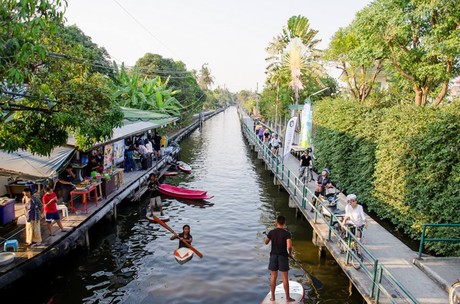Urban SOS 2017 finalists redefine the 'hour city'

A student from Australia’s own RMIT University is among the finalists announced for Urban SOS 2017: hOUR City, a global student ideas competition that challenged multidisciplinary teams to connect more people in regions around the world to the opportunities found in contemporary cities.
An ‘hour city’ radius — the distance people can travel in one hour — has historically defined the boundary of a city. However, with the forces of globalisation and dramatic geographic, social and economic shifts affecting cities everywhere, the time has come to imagine new ways to connect people in suburban, rural and isolated urban communities.
Launched in May by AECOM and Van Alen Institute, along with 100 Resilient Cities — pioneered by The Rockefeller Foundation, hOUR City invited students to tackle urgent transportation, housing or economic development challenges facing cities around the world and to create outcomes that promote equal access to opportunity.
The competition was entered by 86 teams, comprising nearly 300 students from 31 countries around the world and representing 114 academic disciplines. hOUR City convened juries of leading professionals from design, business, government and other sectors in Hong Kong, London, New York and Sydney, who selected the four finalist teams.
The four finalist proposals and teams are listed below.
Alternative Ways of Transportation — Bangkok, Thailand
Submitted by students from King Mongkut’s University of Technology Thonburi, the team developed a new, formalised multimodal pathway along one of Bangkok’s many underutilised canals, connecting isolated residential communities to public transit.
The Healthy City — Oakland, California
Submitted by students from the University of California, Berkeley, the team connects communities suffering from high rates of chronic diseases (eg, asthma, diabetes, etc) to the physical spaces and resources of healthcare providers, using traffic calming, recreational opportunities and new transit options.
The Holding Project — Belfast, Northern Ireland
Submitted by students from Queen’s University Belfast, the team proposes a joint-housing and economic development plan in central Belfast, tailored to young renters aged 18–35. On publicly owned vacant sites, the team envisions new prefabricated micro-units that would save construction time and costs; tenants would set aside 20% of their monthly rent as savings.
New Suburban Living — Melbourne, Australia
Submitted by Lisa Ann Garner from Universität Der Künste and Lauren Garner from RMIT University, the team developed designs and a planning process for new types of housing in Melbourne’s middle suburbs to address the region’s housing shortage and better meet the needs of residents.
“It’s inspiring to see how these multidisciplinary student teams have responded to the challenge to connect urban, suburban and rural communities,” said Stephen Engblom, AECOM global cities director. “From multimodal pathways in Bangkok to bold new housing solutions in Melbourne and Belfast, and public health initiatives for vulnerable populations in Oakland, we believe the finalists’ ideas will bear imaginative solutions to real challenges in those cities that translate globally.”
The four finalist teams will now work with experts at AECOM, Van Alen and 100 Resilient Cities to further develop their proposals, and will present their ideas in Los Angeles before a final jury and live audience on 23 January 2018. The winning team will receive up to US$15,000 in prize money as well as up to US$25,000 of in-kind support from AECOM to realise a pilot project from the team’s proposal.
“We are excited to see the progress of the four finalists in the coming months,” said Michael Berkowitz, president of 100 Resilient Cities. “The work of building urban resilience often requires regional thinking, and the solutions and approaches these teams will uncover have the potential to create significant impact.”
For more information about the finalists, visit http://www.aecom.com/urban-sos-2017-finalists/.
Australia Post sets 2030 emissions targets
The targets focus on reducing the more challenging carbon emissions in Australia Post's...
$320m to power Western Sydney International Airport
Endeavour Energy delivers the first major stage of electricity supply for the Western Sydney...
High-integrity carbon scale to be discussed at Climate Action Week
Leaders across engineered and nature-based carbon removal will come together for a discussion...









